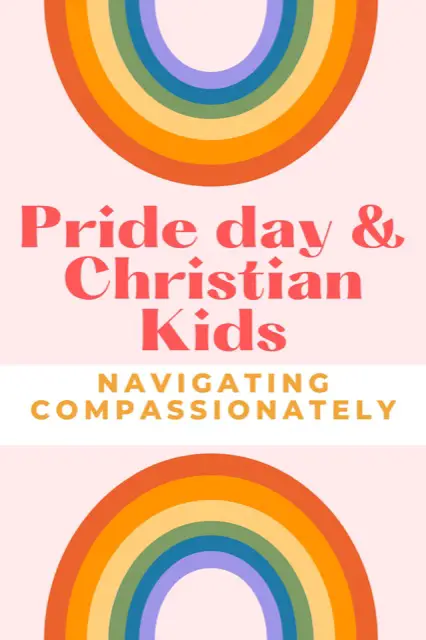
Navigating Pride Day Discussions with Christian Kids: A Compassionate Approach
As we settle into our new life in Canada, we find ourselves immersed in the vibrant celebrations of Pride Month. Rainbow flags proudly wave alongside the Canadian flag, and pride-related merchandise lines the shelves of stores. In this new environment, our 7-year-old daughter’s innocent curiosity led her to ask about the origins of the rainbow flag. This encounter made me reflect on how to approach the upcoming Pride Day at my children’s school. With a desire to provide age-appropriate guidance, I decided to keep them home that day. In this blog post, I will share a compassionate and faith-centered perspective for discussing Pride Day with elementary-age children.
God’s Design for Humanity:
Let’s begin by revisiting the original design of humanity as intended by God. The Bible teaches us that God created man and woman, and His plan was for them to marry and have children. This understanding lays the foundation for discussing human relationships and gender identities.
The Impact of Sin:
We also need to address the concept of sin. In the story of Adam and Eve, their disobedience introduced sin into the world. As a result, people began engaging in various wrongdoings, such as stealing, lying, and even behaviors that challenge traditional gender roles and expectations. Pride Day and the colorful flags we see symbolize support for these actions. It’s essential to explain that Jesus sacrificed Himself to forgive us for our sins, but some people continue to engage in actions that go against God’s plan, which deeply saddens Him.
Embracing Love and Compassion:
While God hates sin, He still loves the individuals who commit these actions. Jesus taught us to love others as we love ourselves, and that includes not hating or ridiculing those who engage in wrongdoing. Instead, we are called to pray silently in our hearts for those who are on a different path and strive to show them compassion.
Addressing Questions:
Encourage an open dialogue with your children by assuring them that it’s okay to have questions. Be prepared to answer their inquiries honestly and gently, considering their age and understanding. Remember to emphasize that it’s our duty to approach these conversations with respect and empathy, just as Jesus would.
Navigating discussions about Pride Day with Christian children requires us to strike a delicate balance between upholding our beliefs and showing compassion towards others. By emphasizing God’s original design, the consequences of sin, and the importance of love and understanding, we can guide our children to navigate these topics with grace and kindness. Let us continue to provide a strong foundation for our children’s faith while nurturing their ability to engage with the diverse world around them.




Good Thought.